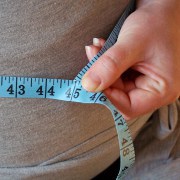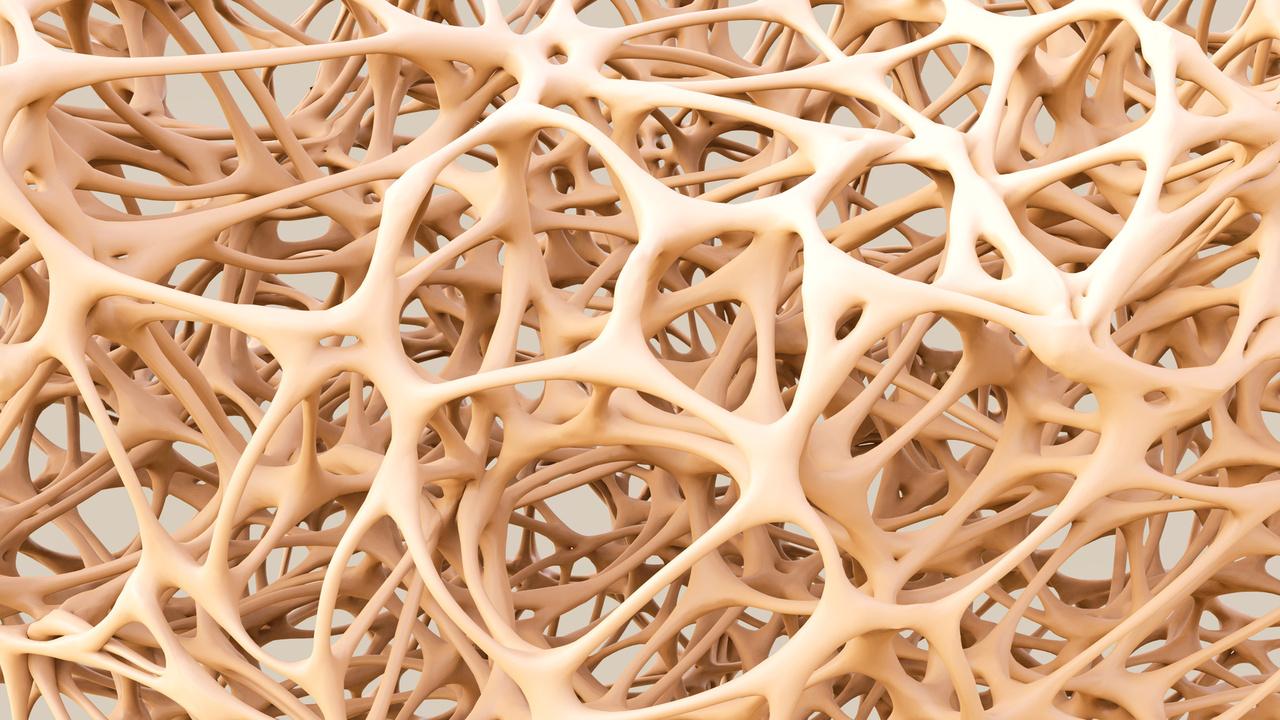 Photo: Getty Images
Photo: Getty Images
Big hips are apparently better from a health perspective than a spare tire. We already knew there was an association between visceral fat (belly fat) and heart disease. Now it appears that this visceral fat can also be a contributor to osteoporosis as well.
According to a study presented to the Radiological Society of North America (RSNA) excessive belly fat can decrease bone density. Women who had more visceral fat had less bone mineral density and more bone marrow fat.
A bone mineral density test measures the amounts of calcium and other minerals in a section of bone. This test is one of several used to evaluate the risk of bone fractures and the possible presence or potential of osteoporosis.
Bone marrow fat refers to the amount of fat accumulated in the bone. Measuring bone marrow fat and bone mineral density is a predictor of weakening bones.
Testing both is more effective than either tested alone. The ratio of bone marrow fat to bone mineral density is higher in healthy people and lower in those with weakened bones.
A study from Georgetown University Hospital in Washington DC demonstrated that high bone marrow fat is a marker for bone weakening. This study was reported in the December 15, 2004 issue of Science Daily.
Visceral fat is also known as intra-abdominal fat. It is found underneath muscle tissue in the abdominal cavity. The amount of visceral fat stored there is affected by diet, exercise and heredity.
This belly fat is also associated with metabolic syndrome which encompasses cardiovascular disease, high blood sugar, high blood pressure, and low HDL (good) cholesterol. Obesity is also associated with asthma, high LDL (bad) cholesterol, joint disease and sleep apnea.
Subcutaneous fat is the tissue under your layers of skin, containing fat and blood vessels. This fat acts as a cushion against any trauma, and is a source of energy during times of activity. Subcutaneous fat as well as total fat don't seem to have a correlation to the levels of bone marrow fat or bone mineral density.
The Centers for Disease Control and Prevention (CDC) defines obesity as having a body mass index (BMI) of 30 or higher. More than 70 million adults in the U.S. are considered to be obese and facing numerous health risks.
The National Women's Health Information Center says that 10 million Americans have osteoporosis. Eighteen million more have low bone density which means they are in danger of developing osteoporosis. Women are more prone to osteoporosis than men.
Resources:
Belly fat puts women at risk for osteoporosis
http://www.eurekalert.org/pub_releases/2010-11/rson-bfp112410.php
For Women, Belly Fat May Lead to Osteoporosis
http://www.myhealthnewsdaily.com/belly-fat-osteoporosis-101130-0806/
Osteoporosis Risk from Belly Fat
http://www.bio-hormone-health.com/2010/12/22/osteoporosis-risk-from-belly-fat/
Bone Marrow Fat May Indicate Bone Weakening
http://www.sciencedaily.com/releases/2004/12/041208084143.htm
Bone mineral density test
http://www.nlm.nih.gov/medlineplus/ency/article/007197.htm
What is Subcutaneous Fat?
http://www.wisegeek.com/what-is-subcutaneous-fat.htm
Visit Jody's website and blog at http://www.ncubator.ca and http://ncubator.ca/blogger






Add a Comment2 Comments
I take 2000 mg of coral calcium every day. I use 1% milk in my daily diet, in fact I'm eating cottage cheese right now with fresh strawberries. I'm almost as big in the belly as I am in the hips. Does this mean my coral calcium is a waste of my time and effort? Should I continue to take it? I don't diet but I try to eat healthy.
April 7, 2011 - 9:09amThis Comment
Calcium is considered effective in preventing and treating bone loss, associated with osteoporosis. You can read more about this supplement at: http://www.nlm.nih.gov/medlineplus/druginfo/natural/781.html.
Coral calcium, however, has not been proven as a better type of calcium for your body (just marketing ploys). You can read more about coral calcium at UC Berkeley Wellness Newsletter: http://www.wellnessletter.com/html/ds/dsCoralCalcium.php.
I am not sure why you are wondering if your coral calcium is a waste of effort...are you taking it to lose weight? It is not proven effective at weight loss; calcium has only been proven effective in increasing calcium levels in the body. Any other "claims" are made by marketing departments and the FDA has actually tried to crack down on some of these false advertisements related to coral calcium.
Talk with your doctor about what type of calcium you need, and how much you should be taking as a supplement (versus eating from calcium-rich foods). Eating naturally-occurring calcium found in foods, and them supplementing with calcium when needed, is always the best approach.
Also be sure you know WHY you are taking calcium, and what you can expect from your supplements. Calcium is not taken as a weight loss drug...EXCEPT for those people who are calcium-deficient...PLUS the people using calcium for weight loss are ALSO on a restricted or low-calorie diet.
Eating healthy is the first step in weight loss, but also knowing how many calories your body needs and staying within that range is the only way to lose weight. If you are eating a lot of healthy and high-calorie foods...you can still gain weight if you are also not exercising or physically active. To lose weight is a simple (but not easy) equation: expend more calories than you consume.
You are on the right track with choosing low-fat dairy instead of whole, as well as consuming lots of fruits and vegetables.
Talk with an R.D. who can calculate your caloric needs, as well as help you with a physical activity/exercise routine to help you lose weight. Exercise is also GREAT for women who are trying to prevent or treat osteoporosis (with doctor approval).
April 7, 2011 - 10:59amThis Comment